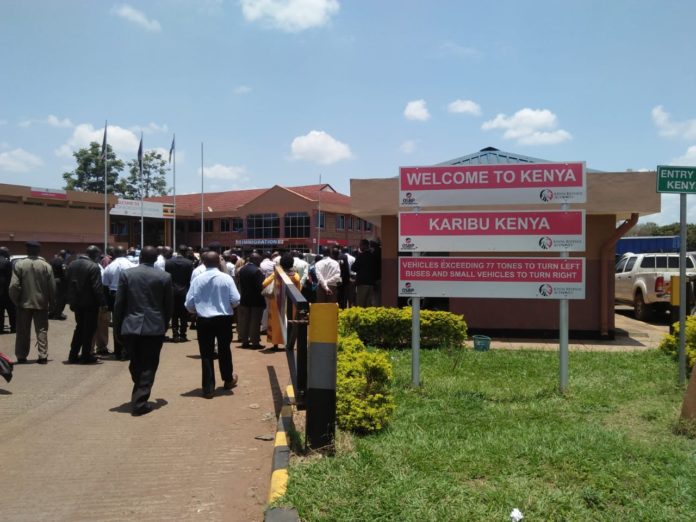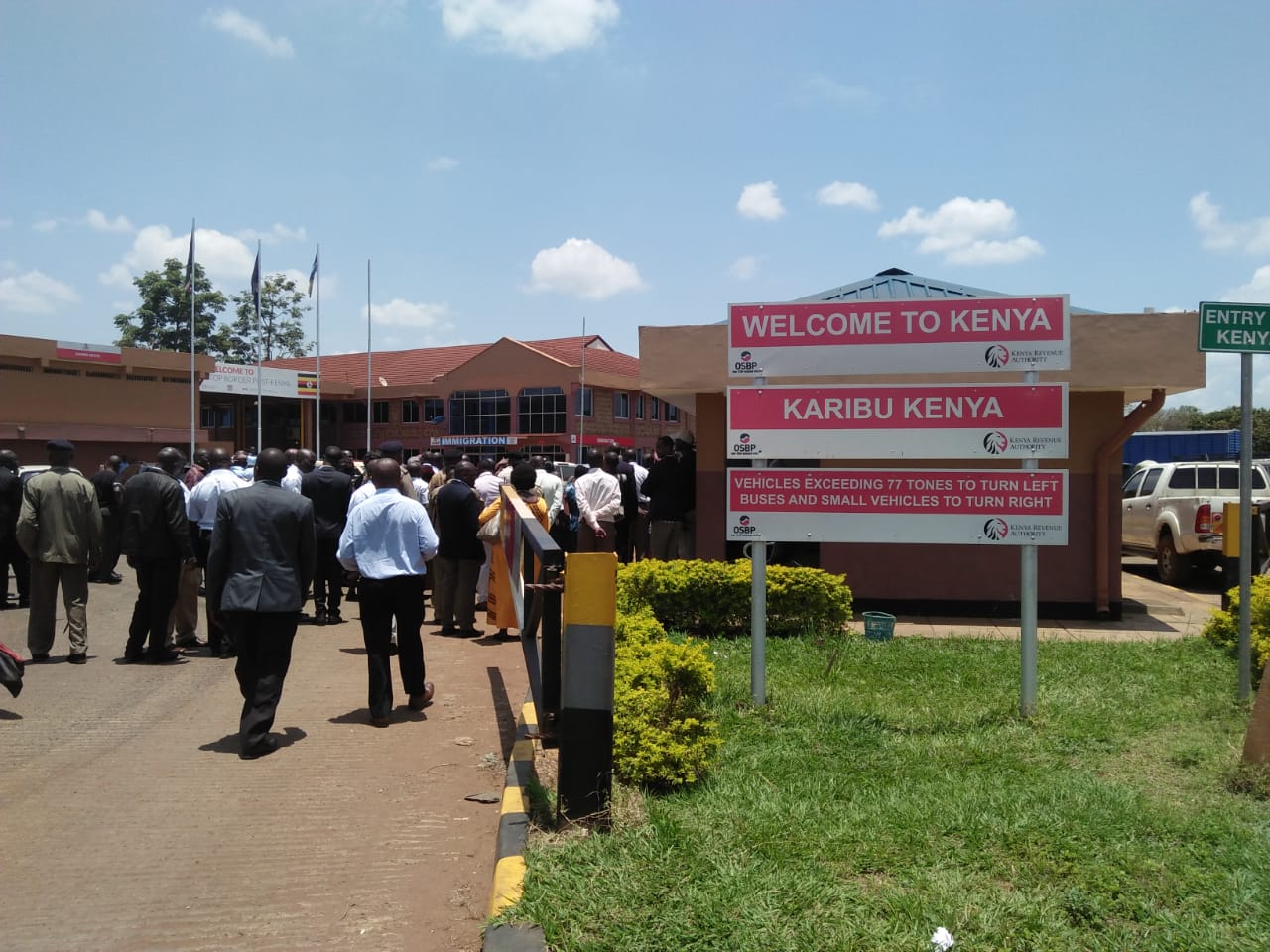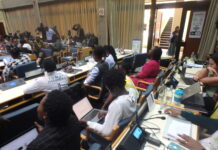By Okong’o Oduya
Busia County, Kenya: For the past few months, the world has seen COVID-19 cause chaos as fatalities rise and economies fall, putting the world at a standstill.
The virus found its way into urban and rural communities in Africa. As a way of preventing infections, countries took drastic measures to control its spread. Countries closed down their borders, airports and other entry and exit points could not allow entry or exit. The move greatly affected the economy of many countries globally.
Among those who have been hit hard by the harsh effects of covid-19 are women in Small and mid-size enterprises ( SMEs).
Busia border is known for a thriving business economy, but now things are different.
Florence Atieno is the chair lady Busia cross Border Association in Busia County. A group of women who engage in small and medium enterprises in Busia County.
Atieno narrates how COVID-19 has affected them as businesswomen in Busia when it was announced in Kenya in March 2020.
It is at this time Kenya and Uganda closed down its borders a few weeks after COVID-19 was announced in Kenya to prevent the spread of the disease.
According to Atieno, there are clients who could not cross over to Kenya to pay them their money after they took their goods on credit, promising to bring the money when they sell them.
“When Kenya and Uganda closed its boundaries as women operating business along the border we were seriously affected. Our agents who are in Uganda could not cross goods to us from Uganda because of the restrictions between these two countries and they have never come back to us or hearing from them,” she said.
In a special interview, Carolyne Barasa who operates a cereal shop in Busia town noted that she ordered maize worth ksh10, 000 from Uganda through her agent but up to date the agent she gave the money never came neither back.
“I gave out sh10, 000 to my agent to buy maize and send it to me since I could not cross to Uganda. The person I gave the money never disappeared, it is now months without a word from him,” she laments.
Beatrice Apondi another member of the association says she was equally affected since her business was to transport goods from Uganda to Kenya but now that they are no longer allowed to so she has to find something else to do which is not rewarding.
According to her, they woke up one morning only to be told that they can no longer cross to Uganda. The goods they had bought worth thousands of money remained in Uganda when COVID-19 was announced in Kenya.
“My business was to move goods from Kenya to Uganda and vise versa, but when we were told not to cross to Uganda some of my goods that I had bought waiting for transportation remained in Ugandan side. I had to stop the business and venture into something else which required capital,” she said.
She says they face harassment and brutality from Uganda security officers manning the Kenya Uganda border as they try to sneak into Uganda through un-gazetted routs in Busia town, in an effort to buy and sell their goods to earn a living.
“We are harassed by police officers from Uganda who is manning these borders when we try to enter into Uganda through un-gazetted routes to buy goods such as cereals, vegetables, fruits among other goods. They go to an extend of stripping us nacked.”
Grace Maloba one of the members of Busia cross Border Business Association says as breadwinners of their families are forced to engage in certain activities such as prostitution just to provide for their families.
She says, their daughters may find themselves engaging in sexual activities, just to get money to buy their necessities since their mothers can’t provide for them.
“Prostitution is on the rise in Busia as a result of COVID-19 since we can’t continue with our business normally, we will engage in sexual immorality to get money to provide for our families. I know when the time will come to do HIV testing their cases will be on increase. Right now the only business we are doing is to sleep with truck drivers, to earn a living and to provide for our family,” she notes.
According to Florence Atieno the women are engaging in the illegal business of smuggling goods in and out of Uganda through porous borders that are endangering them.
She says some women were even raped by Ugandan police officers manning gazetted routes as they tried to gain their entry or exit of Uganda.
“Most of our members started engaging in illegal business such as smuggling which is endangering their lives. Some of our members lost their lives when Ugandan security personnel manning Panya routes used excessive force on them. Others were even raped in the process.
Some of our members have turned into sex workers to provide for their families,” She noted
Emily Major is the Chairlady Fish Traders Association at port Victoria in Budalangi, she narrates how her business has been affected when COVID-19 was reported in the country.
She says the amount of fish she used to sell a day has reduced drastically. According to her, they used to transport more than 7 tons of fish daily to Kisumu, Nairobi, and Nakuru but when COVID-19 was pronounced they only transport 4 tons of fish weekly.
According to her out of 50 members, they have remained 15 members, others have pulled out due to lack of money to continue operating their business.
Business is not normal as usual. Before corona, we used to transport more than 7 tons of fish daily to Kisumu, Nakuru, and Nairobi but when COVID-19 was announced in Kenya we only transport 4 tons of fish a week. We were 50 members before but currently, we are 15 members, the others their business collapsed,” she said.
She says with the curfew and border restrictions between Kenya and Uganda it led to a reduction in the amount of fish from the lake.
“Covid-19 has had a negative impact on us. As you can see my stock has reduced. We don’t get enough fish from the lake. When the government announced the closure of the Kenya and Ugandan border, our fishermen can no longer cross to Ugandan water. If they do that they will be arrested by Ugandan security officers guarding the borders, and no one is ready to risk that.
Initially, fishermen used to fish at night but with a curfew in place, no one goes to the lake at night, or else you risk being arrested by Kenya coast guard police patrolling the lake at night.”
While things are normalizing from the effect of the COVID-19 pandemic, women in small and medium enterprises in Busia County and those involved in cross border business are calling upon the Kenyan and Ugandan governments to open up the border of these two countries to allow them to resume back their businesses.















